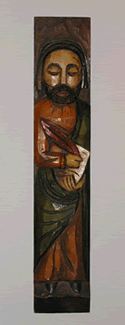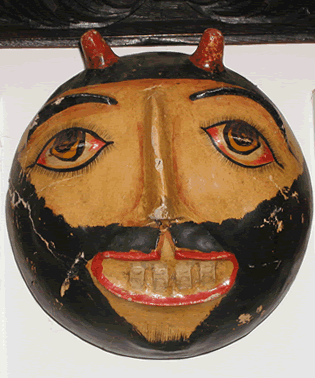|
St Donald Patron saint of booze - from Nick Sabini |
 |
|
St.Donald icon in the author's collection
|
Saint Donald, noble for Birth, but more noble for his great Sanctity, was born at Whirlingpitz in Transylvania. He was born at a very early age, and it is said that in his early teens he lost his parents… in a card game…… so starts the introduction to the life of St.Donald von Whirlingpitz in the 1730 edition of Ribadeneira’s Life Of The Saints. There follows a very long-winded hagiography of this saint who is little known today, but who, in the middle ages, had a cult following of many thousands across Europe. For St.Donald was, in effect, the patron saint of booze.
The hagiography goes on to state that after a very dissolute life, in his late twenties he discovered God in the bottom of a tankard. He became a brother in the monastery of Pyshead, situated in the foothills of the famous Pyshead Mountain, where he divided his time between illustrating theological texts and dispensing herbal remedies to the brothers and to the laity of the town. Many of the illuminations that he painted in the margins of the texts depicted the beautiful snow covered slopes of the locality. Indeed, although his work is known mostly to academics it is said that he is regarded today as one of the greatest piste artists of all time.
It is recorded that in the herbarium where he worked, he produced a ....most wondrous concoction that did instil, in he who did partake of same, a sense of serenity and sanctity, oft’times accompanied by visions of the angels of chastity overcoming the demons of lust…..the failure rate is not recorded, unfortunately, but his fame quickly spread until it reached the ears of the King of Bohemia, who, suffering from a severe depression, called for Donald to attend his court at the royal palace. This he did, and the consequential uplift in the mood of the court resulted in a request from the King to the Pope that Donald should be canonised for this miraculous service to mankind. For it is said that, on a particular occasion, Donald was seen on his knees in the lavatorium, with his head in the bowl, saying, “Oh, my God, “Oh, my God”, and this was taken as a sign that Donald had a direct line to the Man Himself. (In our time, of course, this legend persists in the saying, “He is scrying in the porcelain bowl”.
In the fullness of time Donald received his sainthood, but not before the recipe for his marvellous concoction had become widely known, reproduced in quantity, and sold with much trumpeting, to the general laity. There followed much rejoicing and frolicking in the towns and villages, and among the young men, there developed a sport of kicking an inflated pig’s bladder from one end of the town or village to the other end. This game was always followed by much downing of the concoction with the accompanying visual panorama. In time this became known as freaking, from the Transylvanian word ffriek: to act boisterously.
 |
|
St.Donald mask in the author's collection
|
Eventually, teams, called “freakings” were selected to represent the east and the west ends of each town or village, and it is recorded in Curious Myths of the Middle Ages, by the famous Victorian folklorist, Sabine Barring-Gould, that the western team were usually called the Earwigs. Each side had their own chant which the supporters would give voice to. Hence the chant “Earwig Ho; Earwig Ho: Earwig Ho”, and this would be counteracted by the supporters of the eastern side, who would chant, “We Freakings of Orient are!”, although it is not recorded whether or not they were known to be bearing gifts.
Many miracles were attributed to St. Donald during the Middle ages, and he even had a role in the Mystery Plays, although by this time he was depicted as having horns for some strange reason.
There is no mention of St.Donald in Butler’s Lives of the Saints of 1756-59, or, indeed, in the Penguin Book of Saints of 1972. We can only assume either that an emergent group of blue-stockinged no-hopers managed to squash the movement, or that the cult members suffered from a particularly virulent form of brewers droop and thereby failed to reproduce.
Good news at last, however. St.Donald has been rediscovered and rehabilitated. The cult is alive and well and thriving around the World.